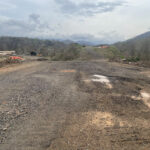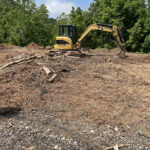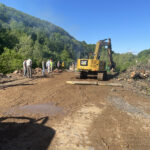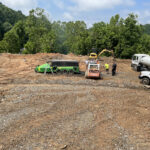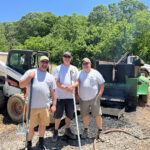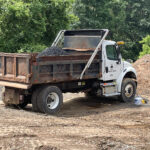During the month of May 2025, the City of Asheville conducted a successful biochar pilot project with the help of the USDA Forest Service at the Southern Research Station. The Forest Service loaned the City a biochar-producing machine called a Charboss and trained City staff to use the equipment. The Charboss is a mobile unit that uses air curtain technology to create a low-oxygen, low smoke/emissions process to convert waste wood into biochar.
Over a total of 10 days using the Charboss, a three-person crew made up of Public Works and Parks and Recreation staff processed 16 truckloads of woody waste material (~420 cubic yards) generated from typical City operations. Processing the material in the Charboss produced approximately 6.25 cubic yards of biochar, which filled most of a small dump truck and was a reduction of greater than 95% in the volume of waste.
Interest in biochar, a stable carbon product, is growing regionally and globally as communities seek sustainable waste management solutions. Biochar has been used to improve soil by storing nutrients and water with benefits for plants, to remove pollutants from stormwater, and for long term storage of carbon, a strategy to slow climate change. The pilot demonstrated the potential to transform woody waste materials from a financial cost into a valuable resource that supports multiple City goals, including reduced tipping fees, wildfire risk management, and carbon emissions offsets. Although the pilot successfully achieved a proof of concept with multiple benefits, larger-scale equipment would be required to effectively accommodate the quantity of woody material typically produced by the City. For example, the Sanitation Division of Public Works averages more than 1,600 truckloads (~48,000 cubic yards) annually.
Jeremy Knighton, an Assistant Fire Chief with the City, noted the value of the Federal and City efforts. “This collaboration with the US Forest Service is a great example of how we can work together to solve some of the pressing problems our communities are facing. We are grateful for the time, expertise, equipment, and support provided by the Forest Service and look forward to more opportunities to work together in the future,” stated Knighton.
The biochar produced during the pilot will be used in small-scale trials to evaluate opportunities in landscape improvement and stormwater management. Additional research and analysis will inform future steps and recommendations for potential biochar production. You can find a summary of the pilot program here.
Thank you to our partners at the Forest Service and the many departments across the City of Asheville, including Communications and Public Engagement, Fire, Legal, Parks and Recreation, Public Works, and Sustainability, for an effective and valuable collaboration!

